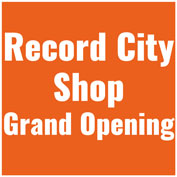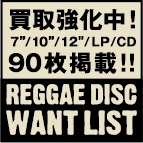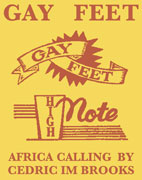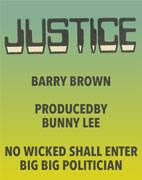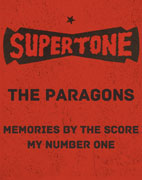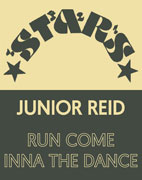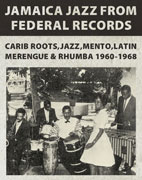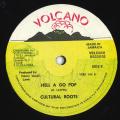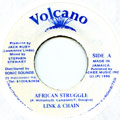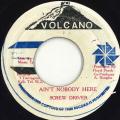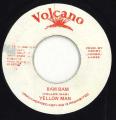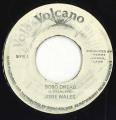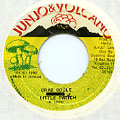VolcanoText by Harry Hawks
Junjo's Volcano label and Hi-Power Sound System dominated Jamaica's music scene in the early eighties with "a star studded camp that included a brash albino named Yellowman and teenaged singer Barrington Levy..."
Volcano
| Place of Establishment | Kingston Jamaica |
| Main Studio(s) | Channel One |
| Founder | Henry 'Junjo' Lawes |
| Producer(s) | |
| Engineer(s) | Scientist Lloyd James |
| Related Label(s) |
"Then I met Junjo Lawes... this was before Barrington Levy had come on. In 1978... '79 I started to give Junjo a couple of tracks and then he met Barrington Levy. After that he started to voice Barrington and he started to mash up the whole place.... came to the UK and Greensleeves."
In 1979 Junjo took Barrington Levy to Channel One studio and, over the next few years, embarked on an odyssey of record production that successfully straddled the gap between the roots based reggae of the seventies and the computer driven music that followed. Proving to be as influential as they were popular his releases on Volcano in Jamaica and Greensleeves in the UK epitomised the nascent dance hall style and he rapidly amassed a body of hit records that no one else could ever hope to better.
Greensleeves Records had opened their first shop in Ealing, West London in 1975 but moved on to larger premises in Shepherds Bush where the shop flourished and where they started their own label in 1977. They first forged links with Junjo when the company released a selection of his Barrington Levy recordings and this soon developed into a mutually beneficial working relationship which proved pivotal in gaining international exposure for Junjo's work. And, as Junjo's status as the music's premier producer grew in Kingston, it did so in London and throughout the rest of the world too.
"Where Greensleeves is concerned me and them grow together inna the business, you know. So whatsoever come between us we take it fe love..." Henry ‘Junjo’ Lawes
Junjo worked closely with the acknowledged originators of the 'dance hall' style rhythm, The Roots Radics, who were formed by The Morwells' rhythm guitarist Eric 'Bingy Bunny' Lamont and bass guitarist Errol 'Flabba' Holt. They then enlisted Lincoln 'Style' Scott on drums, who had learnt to play while serving in the Jamaican Army, and Wycliffe 'Steely' Johnson on keyboards. Noel 'Sowell' Bailey and Dwight Pinkney on guitars alongside veteran keyboard king Gladstone 'Gladdy' Anderson(Gladstone Anderson) completed the era's premier session band. After building the rhythms with The Roots Radics at Channel One on Maxfield Avenue he would then move on to King Tubby's Dromilly Avenue studio to voice and mix. At first Junjo employed Prince Jammy(Lloyd James) on the mixing board but he then began to work closely with Tubby's apprentice engineer, Overton Browne, who had recently started at Tubby's repairing television sets and amplifiers and whose skill at the controls rapidly earned him the name of Scientist.
Nothing succeeds like success and before long a slew of new, previously unrecorded, artists and industry veterans were regularly appearing on the Greensleeves label via the Junjo connection. If an artist was in demand in the UK then one 'phone call to Kingston was all that was required for Junjo to have that artist in the recording studio. Greensleeves knew and understood the market from their retail experience and were able to translate this knowledge into sound business acumen: they knew what their customers wanted and were able to deliver it through Junjo's Kingston connections and, by doing so, became one of the UK's leading record labels.
The list of hit makers on Volcano (and Greensleeves) reads like a who's who of Jamaican music from the eighties: Junjo was not only crucial to the early careers of Eek A Mouse, Barrington Levy, Frankie Paul and Yellowman but also to the continuing popularity of established stars including John Holt, Johnny Osbourne, Leroy Smart, Tony Tuff and The Wailing Souls. His records with Michael Prophet and Cocoa Tea gained an entirely new audience for these respected vocalists and he provided a platform for youthful stars of the dance hall such as Billy Boyo and Little John. Jamaican deejay duo Michigan & Smiley enjoyed their biggest ever hit, 'Diseases', for Junjo where they recited a litany of "the most dangerous diseases". His Kingston built rhythms provided the back drop for UK deejay duo Clint Eastwood & General Saint's first breakthrough hits which were voiced in London. Junjo used Aces International sound system for his live album 'A Live Session With Aces International' recorded in October 1982 which featured Yellowman & Fat Head, Little John, Welton Irie and Billy Boyo and was the biggest selling LP for that Christmas. Ubiquitous does not even begin to come into it...
However, Junjo never owned his own studio but operated out of premises on Myrie Avenue off the Spanish Town Road in Kingston 11 and, inspired by the success of the aforementioned live album, it was from this base that he started his own Volcano Hi-Power sound system in 1983.
"This Volcano Hi-Power business is a form of promotion because if I release ten tune this week I won't be able to get all ten of them play on the radio. On my programme I only can play seven so, to really get some help fe promotion I come about this sound. We play four nights a week..."Henry ‘Junjo’ Lawes
And, with the advent of his hugely successful sound system, Junjo's ubiquity was now transformed into total domination of the reggae scene. Volcano Hi-Power deejays including Charlie Chaplin, Captain Sinbad, Ranking Toyan and the inimitable Josey Wales not only ruled live and direct on the mic. but also on record and Junjo continued to top the charts with his singers too. Junjo enjoyed a superb working relationship with his artists. He understood their trials and tribulations because he came from, and stayed loyal to, the same tough ghetto background that the majority of his performers were only too familiar with. Sinbad later recounted how Junjo was always willing to give both lyrical inspiration and financial incentive to his Volcano artists:
"Junjo was my brethren. He came in the business full of ideas... very creative. A vibes man he'd give you a topic and let you go. Nice to work with... he was one of the first producers in Jamaica to make you know about money." Captain Sinbad
But the perilous proximity to the raw reality of the ghetto eventually proved too real for Junjo and he was imprisoned in the United States in 1985. On his release in 1990 he successfully re-launched his production career working again with Cocoa Tea, Josey Wales and Yellowman but he was murdered in Harlesden, North West London on 13th June 1999. The case remains unsolved. Howard Campbell, writing recently in the Jamaica Observer, stated:
"The arguments about who is reggae's greatest producer are as old as the hills. Clement Dodd(CS Dodd), Lee 'Scratch' Perry(Lee Perry) and Arthur 'Duke' Reid(Duke Reid) are usually the focus of these squabbles. When it comes to style, however, no producer compares to Henry 'Junjo' Lawes...
Tragically, Lawes' lifestyle proved his undoing. He served prison time in the United States and was murdered gangland style in London in 1999. Lawes will also be remembered for his flamboyance. His custom made suits, felt hats and flashy cars set the tone for fashion trends that remain a big part of dancehall music"
Howard Campbell
But, above all, Junjo Lawes will be remembered for the music he made and there are countless compilations currently available of the best of his Volcano releases. One of the best books ever written about reggae music, 'Reggae Inna Dance Hall Style' by Tero Kaski and Pekka Vuorinen, concentrated on the Volcano phenomenon and was written in the eye of the storm in Kingston, 1983. It was recently lavishly updated and re-released as 'Volcano Revisited. Kingston Dance Hall Scene 1983'. The book is 100% essential to an understanding of dance hall music in general and Volcano in particular and serves as a measured memorial to the life and work of Henry ‘Junjo’ Lawes.
Sources:
Steve Barrow & Peter Dalton: Reggae The Rough Guide Rough Guides Ltd. 1997
Howard Campbell: Unsung: The Law According To Junjo Jamaica Observer 2nd November 2012
Essential Further Reading:
Tero Kaski and Pekka Vuorinen: Volcano Revisited. Kingston Dance Hall Scene 1983 Eronen 2011
Date Added: Feb 14, 2013 / Date Updated: Oct 18, 2013
Copyright (C) 2024 Dub Store Sound Inc.
Related Item(s)
| Cultural Roots - Hell A Go Pop(Volcano US)EX-/SEW/WOL |
B side) Leroy Smart - I'm A Don





